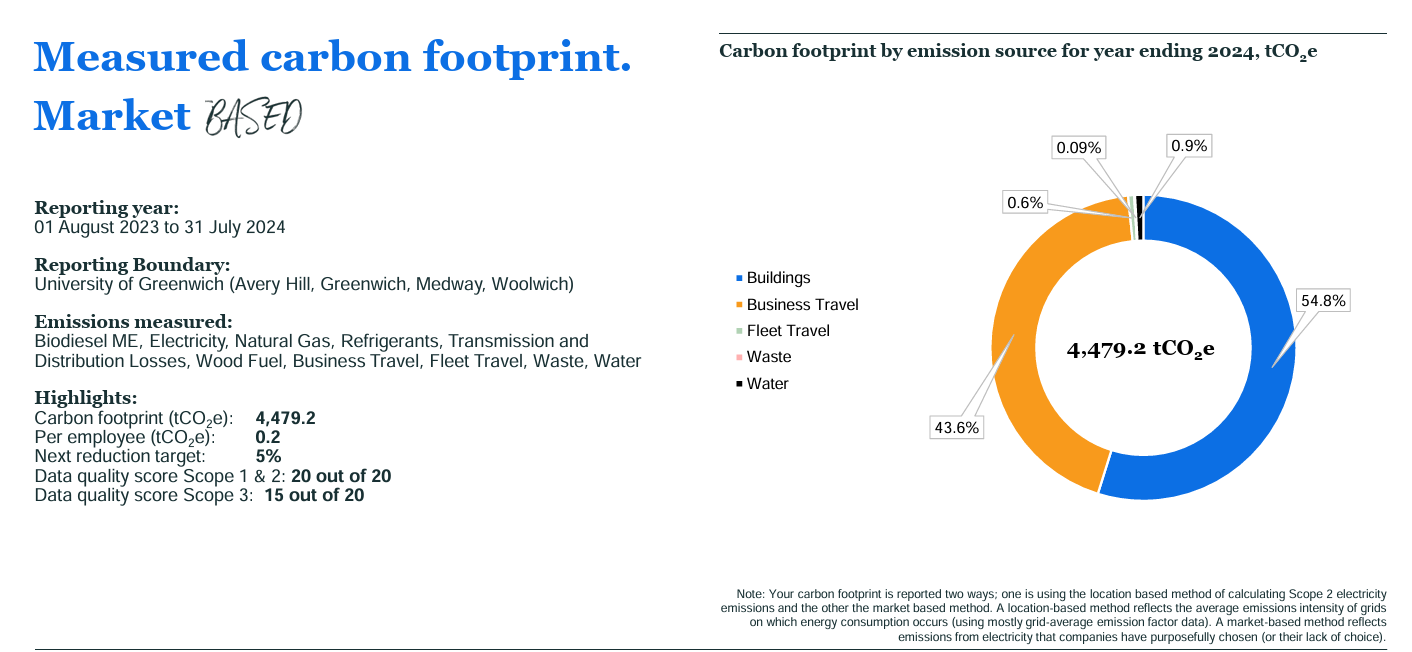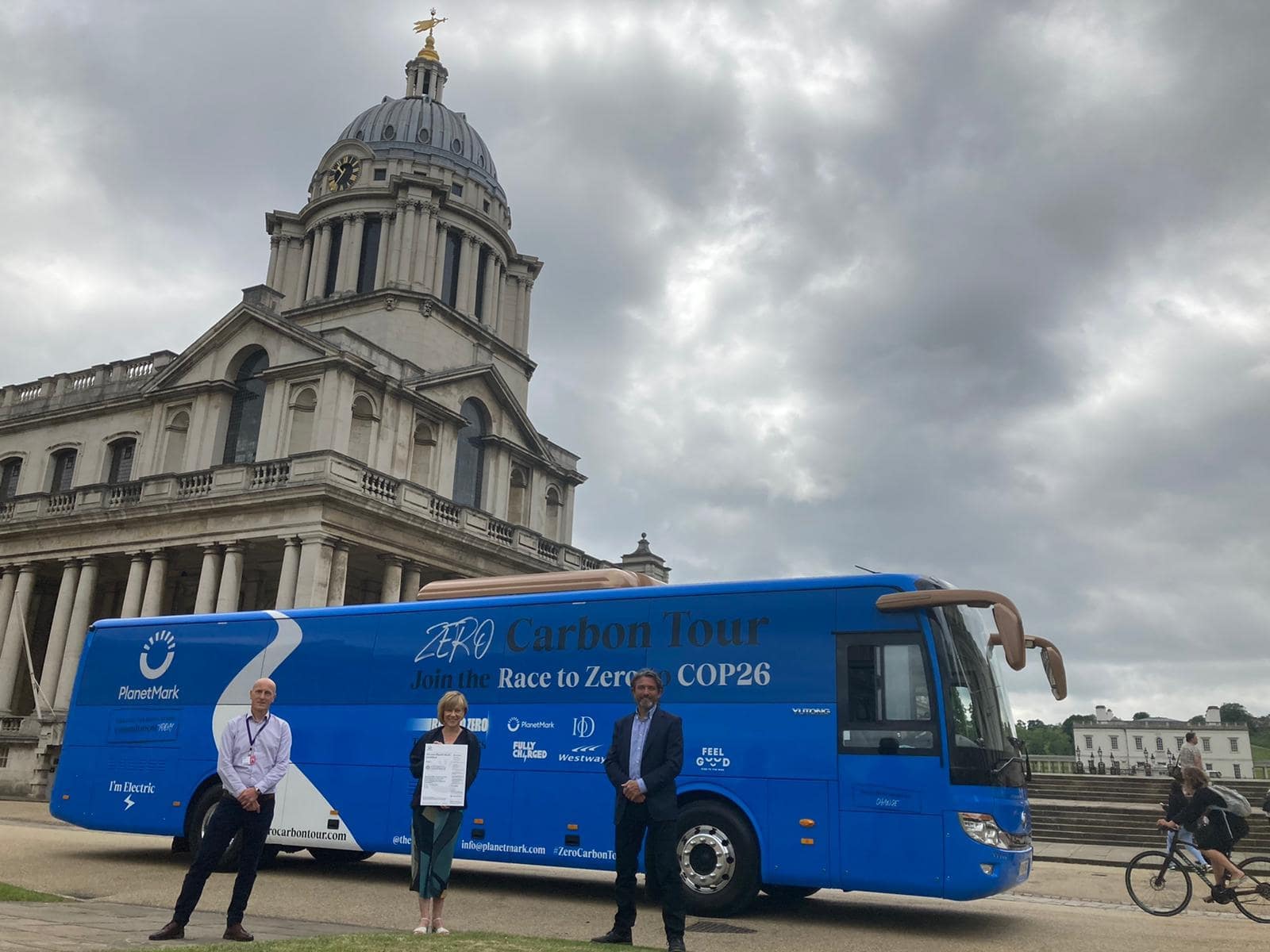Climate change and finite energy resources have been identified as two of the biggest challenges facing the world today. To tackle these issues the university committed to achieving Net Zero by 2033.
Climate change and finite energy resources have been identified as two of the biggest challenges facing the world today. To tackle these issues the university committed to achieving Net Zero. Our Net Zero Action Plan highlights the processes needed to meet our carbon reduction targets:
- Direct emissions (‘Scope 1 & 2’ including electricity, gas and vehicle fleet) have a target of zero.
- Indirect emissions (‘Scope 3’ including Waste, Water and Business Travel (non-fleet) must be reduced by at least 50% by 2030 and must continue to be reduced after 2030 by at least 90% against the baseline by 2050.
- Residual carbon remaining at the net zero target date must be balanced by carbon removal schemes (note that these differ from offsets that avoid or mitigate carbon).
The University has already made significant progress on its decarbonisation journey and this will be completed through our own investments and also partnerships with our local authorities that are developing district heating networks that will serve our Medway and Greenwich campuses. This has meant that although we will fully decarbonise our Avery Hill and Medway campuses by 2030 we will wait to 2033 to fully decarbonise the Greenwich when we will connect to the borough’s district heating network. We will offset emissions the remaining emissions for our estate and business travel emissions from 2030 achieving carbon neutrality for these emission sources. We will continue to purchase zero carbon electricity.
Transparency is crucial and it should be noted that other Scope 3 emissions, such as procured goods and services, employee, or student commuting, have been excluded at this stage but will be considered as a future second phase target for the University to progress to net zero in its full sense. All of these Scope 3 emissions are however reported to national reporting schemes including the Higher Education Statistical Agency EMR Report.
Our achievements so far
- A 60% reduction in Scope 1 & 2 emissions since 2009/10
- Verification of our carbon footprint accuracy by Planet Mark
- Over 260 solar panels installed across campuses
- A combined heat & power plant running on recycled cooking oil
- Electric buses & fleet vehicles, with hybrid coaches
- Zero-carbon air source heat pump reducing carbon emissions at our Avery Hill campus by almost 60%.
Our Carbon Footprint
Planet Mark externally verify our carbon footprint each year, showcasing that the University is accurate, and transparent over our data collection, calculations and analysis. This footprint is aligned to the targets of the Net Zero Action Plan.
Location vs Market Based Electricity Emissions
You may see organisations (including our university) mention either Location-based, Market-based, or both values when referring to electricity consumption and carbon emissions. This is because electricity footprints can be calculated in two ways:
- Location-based: This method reflects the average emissions produced by the national-grid, which includes both renewable and non-renewable (fossil fuel) electricity generation.
- Market-based: This method reflects emissions produced from specifically chosen suppliers including from green or renewable tariffs. Tariffs that provide 100% carbon free/renewable electricity generate zero emissions to make electricity. The University is on a certified Blue Business 100% carbon-free tariff, and has been for over 10 years. This means our electricity carbon footprint is zero, and this is the method used in our Net Zero Plan. We must continue with this tariff to meet our Net Zero ambitions.
Market-based values are seen as more accurate, however, location-based values are used when comparing organisations nationally because some organisations do not know, or have a lack of choice on how their electricity is generated. This makes sector comparisons easier. Reports should say which methods they are using. Regardless of methods, all electricity consumption will have Transmission and Distribution Losses – Scope 3 emissions – lost electricity through the grid network because of technical issues and equipment failures.
It can be argued that with Market-based factors, if on a 100% renewable tariff an organisation does not need to reduce consumption because emissions are zero. However, reducing the consumption will have financial benefit, and by reducing consumption the organisation is opening up the demand for others to join the tariff that will collectively reduce emissions.
Our Footprint 2023-2024
Our 2023-2024 Carbon Footprint Report provides insights in our emission progress (both Location and Market-based emissions values are included for electricity). Members of Planet Mark need to make an annual 5% reduction in Scope 1 & 2 emissions to recertify. At Greenwich, we reduced our absolute Scope 1 and 2 emissions (market-based) by 25.7% in addition to seeing a 10.9% per employee reduction compared to the previous year.

We have over 2,500 rooms across our halls of residences and it is important that we are able to separate out their footprints from our other buildings due to the domestic usage of students. All of our halls of residence, except for Daniel Defoe have electric heating. Daniel Defoe has heating providing by a Combined Heat and Power Plant (CHP) running on wood pellets, with gas boilers as backup.
In addition to those in our ownership, all of Medway halls and half at Avery Hill (Howard, Tudor, Parr, Cleeves) are under operation of a Private Finance Initiative (PFI) contract and are therefore managed separately. McMillan, a third-party hall in Greenwich also houses some of our students. We still have influence over these halls, so these areas are included in behavioural change campaigns.
Aligning to our Net Zero Plan, the electricity emissions are calculated using the Market-Based method, meaning that the electricity emissions are zero. The Scope 1 & 2 emissions for all halls across ownership can be found below and highlights the differences between efficiency and opportunity.

Scope 3 includes water, waste water, waste and transmission and distribution losses. Together this analysis helps to illustrate the innovations taking place across the halls but also where knowledge can be shared to reduce emissions across halls ownership.

Innovation & Infrastructure
Investment will be required in order to make our Net Zero 2033 target a reality. The University has currently invested into the following projects:
- An approved Salix Grant installing Air & Ground Source heat pumps at Avery Hill to cut gas consumption by two thirds, significantly reducing our reliance of fossil fuels.
- 260+ solar PV cells installed across Stockwell Street and Avery Hill halls.
- 130 waterless urinals throughout campuses, saving 13 million litres of water, the equivalent of 43,000 four minute showers.
- Low flow cisterns, taps and showers are installed in all our new and refurbished buildings.
- £430,000+ was spent in 2021, fitting new innovative sensory heaters in three Avery Hill accommodation blocks that can automatically detect room absence to save energy.
- Operational CHP (Combined Heat & Power Plant) at our Medway Campus, running on recycled cooking oil.
We are planning to:
- Install over 300 additional PV solar cells at Avery Hill campus by 2026
- Decarbonise remaining main Avery Hill campus buildings by 2027
- Install air source heat pumps to decarbonise Devonport and Cooper buildings by September 2027
- Connect to local authority district heating network systems at Medway and Greenwich by 2030 and 2033 respectively.
If you have an idea for a carbon saving get in touch with us at sustainability@gre.ac.uk.
Behaviour Change Initiatives
It is not only large-scale investment required however; we all have a responsibility in minimising our consumption of utilities and products. A number of initiatives have been established to encourage positive change and reduce our collective environmental impacts. If you what to get involved, or have a new engagement idea get in touch with us at sustainability@gre.ac.uk.
Make Your Change
Make Your Change is our internal engagement campaign, encouraging students and staff to take small, personal actions from saving energy to buying better. We all have the power to make a positive difference no matter how small the action. For example, if every student reduced their showers down to just 4 minutes we would save approximately 259’000 litres of water a week (assuming an average of 4 showers a week per student at 10 minutes with 9 litres of water used per minute per student).
End of Term Reuse
End of Term Reuse encourages students to donate unwanted items to local charity. Managed by students and operating every Christmas and June, it focuses on waste reduction but also educates on better choice. On average students have donated 3 tonnes of items each year, including clothes, kitchen equipment, books and non-perishable food. This also saves 30 tonnes of carbon emissions annually.
Green Champions
Green Champions are dedicated staff members across the University, helping to drive positive change. We currently have over 60 Green Champions who have co-created our unique approach that helps staff meet their sustainability objectives. We believe that using the passion and expertise of our staff we can develop ideas and deliver these that will create significant environmental progress.
Planet Mark

Planet Mark are a carbon foot printing verification body, helping organisations to be transparent and accurate in their carbon emission target setting. Forming part of the Business Certification, and assisting the Net Zero Action Plan, with Plant Mark’s support, and with identifying new data sets, our carbon footprint will continue to reflect our total University contribution, and lead to further opportunities in reducing it.